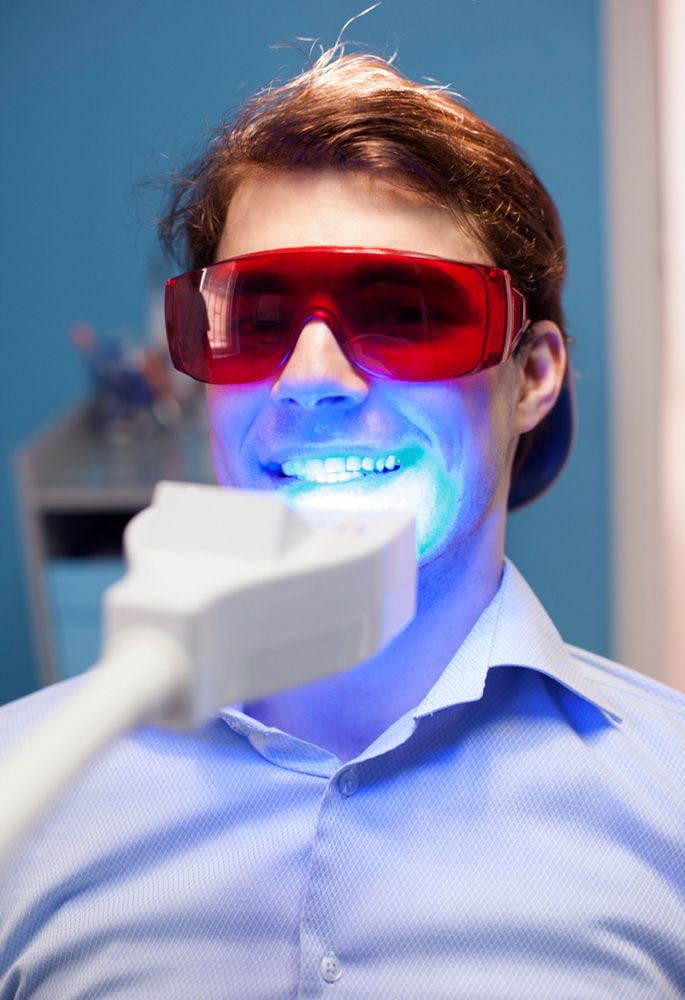Tooth Sensitivity and Teeth Whitening
 During a teeth whitening session, a bleaching agent is applied directly to your teeth. This bleaching agent whitens the tooth enamel itself. In essence, the stain isn’t removed from the teeth but instead the whole tooth is bleached to ensure brightness and whiteness.
During a teeth whitening session, a bleaching agent is applied directly to your teeth. This bleaching agent whitens the tooth enamel itself. In essence, the stain isn’t removed from the teeth but instead the whole tooth is bleached to ensure brightness and whiteness.
Our teeth whitening patients in the Brooklyn Heights and Fort Greene area often wonder why tooth sensitivity occurs after treatment. Dr. Eugene D. Stanislaus and Dr. Lisa Reid answers questions about tooth sensitivity after teeth whitening, and offer advice on how to reduce the discomfort you may feel.
Why Tooth Sensitivity Happens
As the bleaching agent penetrates into the existing tooth structure, it hits the deeper layers of enamel where it can make some contact with the dentin layer of the tooth. The dentin is porous, and the bleaching solution makes the pores in the dentin far more sensitive to pressure and temperature.
Rest assured that tooth sensitivity is common after undergoing teeth whitening treatment. All patients will experience some degree of it, and it can be managed in a number of ways.
How We Limit Tooth Sensitivity at Our Practice
When performing teeth whitening treatment here at Brooklyn Heights Dental, we ensure that the teeth are only exposed to the whitening solution for a set amount of time. We don’t want the teeth to be overexposed to the whitening agent, as this can lead to increased tooth sensitivity.
We will often apply a tooth desensitizer after treatment as well. This desensitizer will help reduce tooth sensitivity in the first few hours after treatment, when the discomfort is usually the most pronounced.
Altering Your Diet to Reduce Discomfort
There is plenty you can do at home after teeth whitening to help manage tooth sensitivity. The best thing to do is to alter your diet in the first few days after teeth whitening. Be sure to eat soft foods that do not require a lot of chewing. This will reduce the pressure exerted on your teeth, and help you avoid discomfort.
In addition, we recommend that you avoid foods and beverages that are too hot or too cold in temperature. Try to have food items that are lukewarm or room temperature, as these will generally help you avoid pain when eating or drinking.
Proper Oral Hygiene with Tooth Sensitivity
While dealing with tooth sensitivity, you still have to keep your teeth clean. The ideal way to practice good oral hygiene without causing undue discomfort is to use a toothpaste for people with sensitive teeth. This will make a major difference in the first days after teeth whitening.
Since a few whitening sessions are necessary for optimal results, you’ll have your sensitive tooth toothpaste ready for the brief phase of sensitivity after each treatment cycle.
How Long Will the Tooth Sensitivity Last?
Usually teeth whitening will last for about a week, though it can vary from patient to patient. The sensitivity becomes less and less of an issue with each passing day. If you do not experience an improvement of tooth sensitivity, we can discuss it in greater detail during your follow-up care visit.
Contact Brooklyn Heights Dental
If you would like to learn more about teeth whitening treatment and why it may be right for you, be sure to contact our skilled team of cosmetic and restorative dentists. You can reach our practice by phone at (877) 978-1050.



